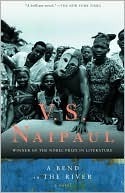More on this book
Community
Kindle Notes & Highlights
The world is what it is; men who are nothing, who allow themselves to become nothing, have no place in it.
People lived as they had always done; there was no break between past and present. All that had happened in the past was washed away; there was always only the present. It was as though, as a result of some disturbance in the heavens, the early morning light was always receding into the darkness, and men lived in a perpetual dawn.
So from an early age I developed the habit of looking, detaching myself from a familiar scene and trying to consider it as from a distance. It was from this habit of looking that the idea came to me that as a community we had fallen behind. And that was the beginning of my insecurity.
My family were not fools. My father and his brothers were traders, businessmen; in their own way they had to keep up with the times. They could assess situations; they took risks and sometimes they could be very bold. But they were buried so deep in their lives that they were not able to stand back and consider the nature of their lives. They did what they had to do. When things went wrong they had the consolations of religion. This wasn’t just a readiness to accept Fate; this was a quiet and profound conviction about the vanity of all human endeavour.
If it was Europe that gave us on the coast some idea of our history, it was Europe, I feel, that also introduced us to the lie.
The Europeans wanted gold and slaves, like everybody else; but at the same time they wanted statues put up to themselves as people who had done good things for the slaves. Being an intelligent and energetic people, and at the peak of their powers, they could express both sides of their civilization; and they got both the slaves and the statues.
“They aren’t worth anything now. But they will be again. I really should be giving it to you for nothing. But that would be bad for you and for me. You must always know when to pull out. A businessman isn’t a mathematician. Remember that. Never become hypnotized by the beauty of numbers. A businessman is someone who buys at ten and is happy to get out at twelve. The other kind of man buys at ten, sees it rise to eighteen and does nothing. He is waiting for it to get to twenty. The beauty of numbers. When it drops to ten again he waits for it to get back to eighteen. When it drops to two he
...more
And that could make for an odd feeling: to be among the ruins was to have your time-sense unsettled. You felt like a ghost, not from the past, but from the future. You felt that your life and ambition had already been lived out for you and you were looking at the relics of that life. You were in a place where the future had come and gone.
I knew other things about the forest kingdom, though. I knew that the slave people were in revolt and were being butchered back into submission. But Africa was big. The bush muffled the sound of murder, and the muddy rivers and lakes washed the blood away.
A death like that makes us question everything. But we are men; regardless of the deaths around us we continue to be flesh and blood and mind, and we cannot stay with that questioning mood for long.
If you look at a column of ants on the march you will see that there are some who are stragglers or have lost their way. The column has no time for them; it goes on. Sometimes the stragglers die. But even this has no effect on the column. There is a little disturbance around the corpse, which is eventually carried off—and then it appears so light. And all the time the great busyness continues, and that apparent sociability, that rite of meeting and greeting which ants travelling in opposite directions, to and from their nest, perform without fail.
It isn’t that there’s no right and wrong here. There’s no right.”
You so quickly get used to peace. It is like being well—you take it for granted, and forget that when you were ill, to be well again had seemed everything. And with peace and the boom I began to see the town as ordinary, for the first time.
“It isn’t easy to turn your back on the past. It isn’t something you can decide to do just like that. It is something you have to arm yourself for, or grief will ambush and destroy you. That is why I hold on to the image of the garden trampled until it becomes ground—it is a small thing, but it helps.
With each job description I read, I felt a tightening of what I must call my soul. I found myself growing false to myself, acting to myself, convincing myself of my rightness for whatever was being described. And this is where I suppose life ends for most people, who stiffen in the attitudes they adopt to make themselves suitable for the jobs and lives that other people have laid out for them.
I often wonder what would have happened to me if I hadn’t made that decision. I suppose I would have sunk. I suppose I would have found some kind of hole and tried to hide or pass. After all, we make ourselves according to the ideas we have of our possibilities. I would have hidden in my hole and been crippled by my sentimentality, doing what I was doing, and doing it well, but always looking for the wailing wall.
Satisfaction solved nothing; it only opened up a new void, a fresh need.


